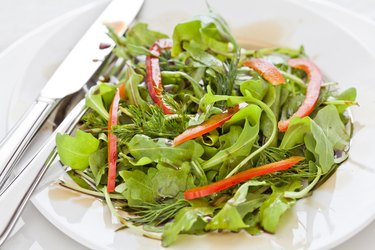
The stomach, one of many organs involved in digestion. The stomach dilutes the food you eat with digestive juices before moving it into your intestines for further break down. Factors that impact the health of your digestive system include untreated infections, medical conditions, diet and lifestyle. These factors can cause inflammation in your stomach resulting in polyp formation. Healthy dietary habits may help reduce the risk of stomach polyp formation and digestive system complications.
About Stomach Polyps
Video of the Day
Inflammation of the cells that line your stomach or mutations in the cells form masses, or polyps. Generally, polyps rarely form and remain benign. Co-occurring bacterial infections, gastritis or use of medications to treat other digestive problems like reflux disease increase your risk of polyp formation. If the polyps result from glandular cell mutations in the stomach, the risk of malignant cells increases, but this is not common with stomach polyps. Symptoms of stomach polyps may not appear until they enlarge gradually and form ulcers. Abdominal pain, gastric bleeding and nausea or vomiting may present with large stomach polyps. Treatment involves removal of the polyps with a endoscopy procedure; however, the polyps may return if you have relapsing gastritis problems.
Video of the Day
Diet, Polyps and Gastritis
Dietary habits do not necessarily cause the formation of stomach polyps, but gastritis can -- and diet plays a role in this condition. Gastritis results from irritants that cause inflammation of the lining of your stomach. Highly acidic foods or beverages like coffee, soda and fruit juice with citric acid, bacteria like Salmonella or E. coli from contaminated foods and excess alcohol use can irritate your stomach. If you have gastritis, your physician may also test for stomach polyps. Untreated gastritis with stomach polyps can increase your risk of malignant polyps and stomach cancer.
Fruits and Vegetables
Fruits and vegetables contain fiber to nourish healthy digestive bacteria and antioxidants from vitamins. Antioxidants neutralize harmful free radical molecules that influence abnormal cell growth in your stomach. Berry varieties, apples, leafy greens, squash and bell peppers are nutrient rich produce options to maintain digestive health. You should include at least 5 servings of fruit and vegetables in your daily diet according to Cleveland Clinic. Avoid or limit portions of high acid fruits like oranges or grapefruit to minimize stomach irritation. The American Cancer Society suggests avoiding pickled vegetables because these may increase stomach cancer risk.
Whole Grains and Beans
Whole grains and bean varieties are fiber-rich and high in the B-vitamins, which promote normal digestive functions. Choose wheat bread or pasta, bran cereals, brown rice and barley products instead of refined white grains with less fiber and nutrients. Black, navy, and kidney beans are also good sources of fiber and are low in acidity.
Foods to Limit
Fatty red meat, fried foods, whole dairy and processed foods do not digest readily, increase stomach acid production and may cause stomach lining irritation. Replace high-fat foods with fresh fish, baked poultry, low-fat dairy and olive oil to minimize your daily fat intake. Carbonated beverages and drinks with high caffeine content should be limited. Consult your physician for dietary instructions based on your specific condition and nutritional needs.
- American Cancer Society: Stomach Cancer
- Chicago Endoscopy Center: The Stomach
- Cleveland Clinic; Healthy Eating for the Digestive System; May 22, 2008
- MayoClinic.com; Dietary Fiber; Essential for a Healthy Diet; Mayo Clinic Staff; Nov. 2009
- University of Maryland Medical Center; Gastritis; Steven D. Ehrlich, NMD; Sept. 8, 2009
Is this an emergency? If you are experiencing serious medical symptoms, please see the National Library of Medicine’s list of signs you need emergency medical attention or call 911.